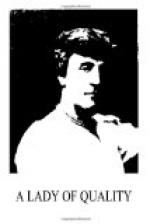“You would not—let him enter?”
Clorinda threw her graceful body into a chair with more light laughter.
“I would not”, she answered. “You cannot understand such ingratitude, poor Anne; you would have treated him more softly. Sit down and talk to me, and I will show thee my furbelows myself. All women like to chatter of their laced bodices and petticoats. That is what makes a woman.”
Anne was tremulous with relief and pleasure. It was as if a queen had bid her to be seated. She sat almost with the humble lack of case a serving-woman might have shown. She had never seen Clorinda wear such an air before, and never had she dreamed that she would so open herself to any fellow-creature. She knew but little of what her sister was capable—of the brilliancy of her charm when she chose to condescend, of the deigning softness of her manner when she chose to please, of her arch-pleasantries and cutting wit, and of the strange power she could wield over any human being, gentle or simple, with whom she came in contact. But if she had not known of these things before, she learned to know them this morning. For some reason best known to herself, Mistress Clorinda was in a high good humour. She kept Anne with her for more than an hour, and was dazzling through every moment of its passing. She showed her the splendours she was to shine in at the birth-night ball, even bringing forth her jewels and displaying them. She told her stories of the house of which the young heir to-day attained his majority, and mocked at the poor youth because he was ungainly, and at a distance had been her slave since his nineteenth year.
“I have scarce looked at him,” she said. “He is a lout, with great eyes staring, and a red nose. It does not need that one should look at men to win them. They look at us, and that is enough.”
To poor Mistress Anne, who had seen no company and listened to no wits, the entertainment bestowed upon her was as wonderful as a night at the playhouse would have been. To watch the vivid changing face; to hearken to jesting stories of men and women who seemed like the heroes and heroines of her romances; to hear love itself—the love she trembled and palpitated at the mere thought of—spoken of openly as an experience which fell to all; to hear it mocked at with dainty or biting quips; to learn that women of all ages played with, enjoyed, or lost themselves for it—it was with her as if a nun had been withdrawn from her cloister and plunged into the vortex of the world.
“Sister,” she said, looking at the Beauty with humble, adoring eyes, “you make me feel that my romances are true. You tell such things. It is like seeing pictures of things to hear you talk. No wonder that all listen to you, for indeed ’tis wonderful the way you have with words. You use them so that ’tis as though they had shapes of their own and colours, and you builded with them. I thank you for being so gracious to me, who have seen so little, and cannot tell the poor, quiet things I have seen.”




